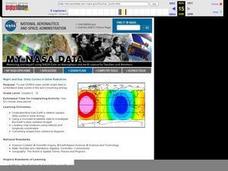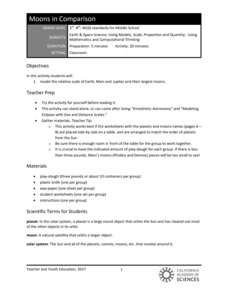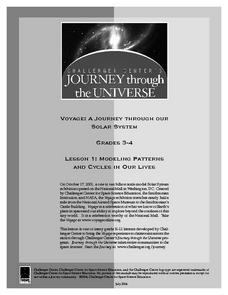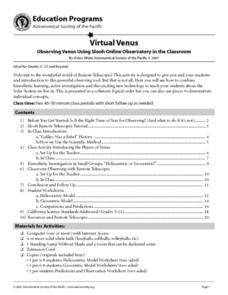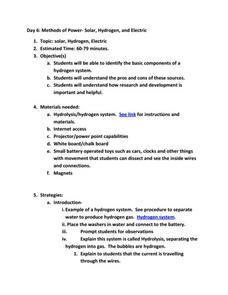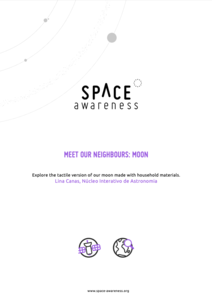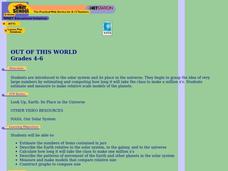Curated OER
History of Our Solar System Time Line
Ninth graders explore the concept of ratios. In this ratio lesson, 9th graders construct a to scale time line that starts at the beginning of time. Students determine the correct placement of big events in time such as when the dinosaurs...
Curated OER
The Battle for Ultimate Power
Students gain an understanding of how the powers of 10 and scientific notation can be used to represent the scale of things in the universe. They relate the number of stars in the universe to the number of grains of sand on Earth's beaches.
Stanford University
Solstice and Equinox Season Model
How can December 21 be the shortest day of the year when all days are 24 hours long? Pupils see how to build a model showing the differences between winter and summer solstices and equinoxes. Using this model, classes can then discuss...
Curated OER
NIGHT AND DAY: DAILY CYCLES IN SOLAR RADIATION
Students examine how Earth's rotation causes daily cycles in solar energy using a microset of satellite data to investigate the Earth's daily radiation budget and locating map locations using latitude and longitude coordinates.
California Academy of Science
Moons in Comparison
Just how big is Earth's moon? With a hands-on simulation, scholars use Play-Doh to model the sizes of the planets Earth, Mars, Jupiter, and their moons. They make predictions as a class, work together to make their models, and discuss...
Curated OER
Modeling Patterns and Cycles in Our Lives
Students explore how building a model can help them better understand the natural world. They identify common cycles or patterns in nature as well as examples of models in the classroom. After discussion, they choose a pattern or cycle...
Curated OER
an Explorative Journey Through the Solar System
Students, in groups, research a planet from our solar system. They create Styrofoam models of the planets and place the planets on a correct distance scale from the sun.
Curated OER
Bringing the Solar System to Life
Young scholars make models of the planets and use the models to show revolution of the planets around the sun. They explain the rotation of the planets after demonstrating with balloons.
Curated OER
NASA's Mars gamble pays off
Students read an article about NASA and Mars and complete short answer questions about the article. For this Mars lesson plan, students also create a scale model of the solar system.
University of Colorado
Modeling Sizes of Planets
The density of the huge planet of Saturn is 0.7 g/cm3, which means it could float in water! In the second part of 22, science pupils explore the size and order of the planets. They then calculate weight and/or gravity and density of...
Teach Engineering
Photosynthesis—Life's Primary Energy Source
Wouldn't it be great if you could produce your own food? Scholars learn about the processes of photosynthesis and cellular respiration in plants. They consider how to use photosynthesis as a model of an efficient system and how to apply...
Curated OER
Virtual Venus
Students practice using the tool of remote telescopes in order to make observations in space. The lesson includes the best times of year to make observations. They use the internet to obtain information and to initiate the use of the...
Laboratory for Atmospheric and Space Physics
Jupiter’s Relative Size
How do you properly illustrate the extreme size difference between two planets—Earth and Jupiter? With the help of jellybeans, of course! Create a scale model of Jupiter's mass compared to Earth using a fishbowl, 1,400 beans, and a...
Curated OER
Try This On For Size!
Students view a video to gather information about our solar system. They create models of the planets to scale and place them in scale relative to their distances from the sun. They also visit a planetarium or use the internet to gather...
Curated OER
On Jupiter
Students tour Jupiter. In this scenario based lesson, students examine the size of Jupiter and make models of the other planets in the solar system to show how large Jupiter is compared to the other planets.
Curated OER
Methods of Power- Solar, Hydrogen, and Electric
Young scholars examine solar, hydrogen, electric power. In this research based lesson, students will do simple investigations, view videos, discuss, and research how these three types of energy are used for power. They illustrate a...
Curated OER
The Sun-Earth Connection
Third graders research about the location of different planets from the sun. For this earth science lesson, 3rd graders discuss the weather in their place and identify common weather terminologies. They explain how tornadoes form and...
Bonneville
Solar Panel Basics
Going outside is a logical step when dealing with solar panels. Future scientists learn about the n-type and p-type layers of solar cells in the third of 14 lessons in the Cost Effective Solar Cells unit. They go outside to model the...
Space Awareness
Meet Our Neighbors: Moon
Since a field trip to the moon isn't possible, bring the moon to young astronomers! Participants use everyday materials to create models of the moon and represent the features on its surface. The materials serve as a tactile as well as a...
Curated OER
Residential Power System
Perform data analysis on energy consumption to apply algebraic expressions to the real world. Learners will write and solve equations that answer various questions from residential power use. They will collect data at home and calculate...
Baylor College
People and Climate
Model how the sun's energy strikes the planet and help your class relate it to a climate map. Assign small groups an individual climate zone to discuss. They reflect on and research how humans survive in the assigned climate and write a...
Curated OER
Space, the Final Frontier...
Students study a common theory on how the solar system was formed and examine the relative scale of the size and distances among the bodies of the Solar System.
Curated OER
Out of This World
Students are introduced to the solar system and its place in the universe. They begin to grasp the idea of very large numbers by estimating and computing how long it take the class to make a million x's.
Curated OER
The Nine Planets
Sixth graders examine and investigate the solar system. They participate in a Webquest, and create a Powerpoint presentation that is meant to be a research guide to help alien visitors find a suitable habitat in the solar system.
Other popular searches
- Solar System Model
- Rubric Solar System Model
- Space Solar System Model
- Solar System Model Projects
- The Solar System Model
- Build Solar System Model
- Solar System Scale Model
- Solar System Model Lessons
- Building Solar System Model
- Scale Model of Solar System
- Solar System Model of Clay





